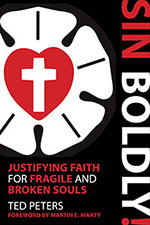
Can faith as trusting God make a difference? Absolutely&3151;by relieving our anxiety over self-justification and the need to scapegoat others. When we discover we don't justify ourselves because God has justified us, we become free. What Sin Boldly! points to is the presence of the crucified and living Christ in the human soul, placed there by the Holy Spirit. And this becomes transformative.
Can faith as trusting God make a difference? Absolutely&3151;by relieving our anxiety over self-justification and the need to scapegoat others. When we discover we don’t justify ourselves because God has justified us, we become free. What Sin Boldly! points to is the presence of the crucified and living Christ in the human soul, placed there by the Holy Spirit. And this becomes transformative.
Sin Boldly! provides an experiential analysis of the contrast between self-justification and justification by God. Those among us with fragile souls are anxious, and we shore up our anxiety with walls of self-justification that victimize those whom we scapegoat. Those among us with broken souls have lost the very moral universe that makes any kind of justification possible, and this usually leads to anomie and suicide. We must pose the question: how can the gospel of grace provide transformation for both fragile and broken souls? After an exposition of the Joint Declaration on the Doctrine of Justification, this book proposes the following answer: trusting in the God of grace relieves anxiety and provides a divine vocation that transcends our moral universe with the promise of forgiveness, renewal, and resurrection.


